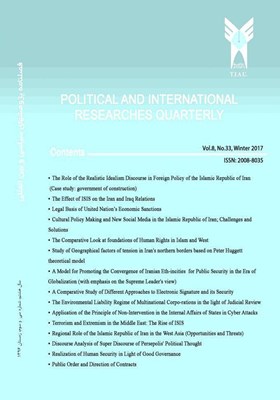-
-
List of Articles
-
Open Access Article
1 - The Role of Discourse on Realist Idealism in Foreign Policy of the Islamic Republic of Iran
-
Open Access Article
2 - The Effect of ISIS on the Iran and Iraq Relations
-
Open Access Article
3 - Legal Basis of United Nation’s Economical Sanctions
-
Open Access Article
4 - Cultural Policy Making and New Social Media in the Islamic Republic of Iran; Challenges and Solutions
-
Open Access Article
5 - The Comparative Look at foundations of Human Rights in Islam and West
-
Open Access Article
6 - Investigating the Geographic Stress of Iran's Northern Borders Based on Peter Huget's Theoretical Model
-
Open Access Article
7 - A Model for Promoting the Convergence of Iranian Ethnicities for Public Security in the Era of Globalization (with emphasis on the Supreme Leader's view)
-
Open Access Article
8 - A Comparative Study of Different Approaches to Electronic Signature and its Security
-
Open Access Article
9 - The Environmental Liability Regime of Multinational Corporations in the light of Judicial Review
-
Open Access Article
10 - Application of the Principle of Non-Intervention in the Internal Affairs of States in Cyber Attacks
-
Open Access Article
11 - Terrorism and Extremism in the Middle East: The Rise of ISIS
-
Open Access Article
12 - Regional Role of the Islamic Republic of Iran in the West Asia (Opportunities and Threats)
-
Open Access Article
13 - Discourse Analysis of Super Discourse of Persepolis' Political Thought
-
Open Access Article
14 - Realization of Human Security in Light of Good Governance
-
Open Access Article
15 - Public Order and Direction of Contracts
-
The rights to this website are owned by the Raimag Press Management System.
Copyright © 2021-2025







